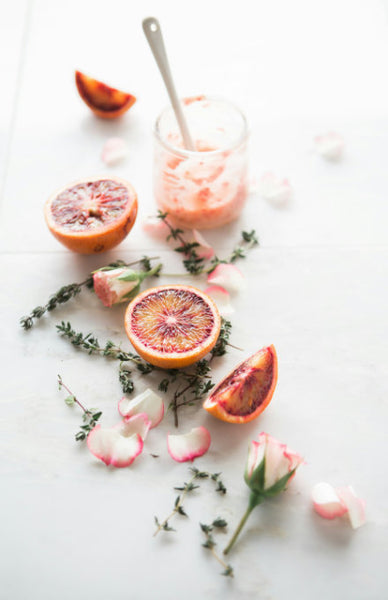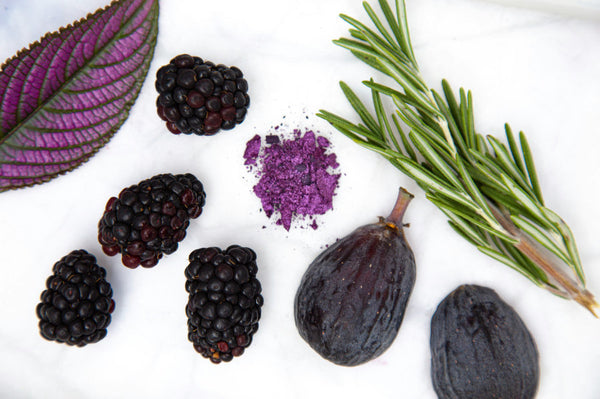100% natural ingredients that look good
Recently, we often see cosmetics that say "100% natural ingredients." Even if they are not 100%, cosmetics that advertise that they contain a lot of natural ingredients seem to be gaining popularity.
In addition to the phrase 100%, you may also see phrases like the following.
"Natural ingredients make it gentle on the skin"
"It's made from natural ingredients, so it can be used on babies."
What do you think when you see a catchphrase like this? Many people might think, "That sounds good."
But what is the basis for the catchphrases above? In this article, we would like to reveal the little-known truth about "natural ingredients" in cosmetics.

Natural and naturally derived ingredients
When considering the origin of the ingredients, there are three types of cosmetic ingredients:
- Natural ingredients
- Naturally derived ingredients
- Synthetic ingredients
What is of concern here is "natural ingredients" and "naturally derived ingredients."
These two may seem similar, but they are completely different. What exactly are the differences?
What are natural ingredients?
These are made from ingredients found in nature, such as animals, plants, and minerals. In other words, they are made into cosmetic ingredients without any chemical processing , keeping the molecular structure of the naturally occurring ingredients.
The manufacturing method is simple so as not to destroy the structure created naturally.
- distillation
- Solvent extraction
- Dissolve in water
- Squeezing
It can be made in a relatively simple way. The main ingredients are as follows:
- Essential oils (orange peel oil, lavender oil, etc.)
- Cold pressed vegetable oils (sunflower seed oil, avocado oil, etc.)
- Plant extracts ( tea leaf extract, grapefruit seed extract, etc.)
- Minerals (such as iron oxide and titanium oxide )
The main feature of this product is that it is easy to understand what the raw materials are by the ingredient names.

What are naturally derived ingredients?
On the other hand, natural ingredients are chemically processed raw materials that exist in nature. They have a completely different molecular structure from natural ones and are artificially adjusted and improved.
Some ingredients are synthetic, while others are made by extracting and attaching specific substances contained in natural ingredients. By applying such processing, high functionality and new effects as cosmetic ingredients can be created.
In other words, it is an artificial ingredient that does not exist in nature.
It may not be 100% synthetic because it uses natural ingredients as part of its ingredients, but it is at least in the same league as synthetic ingredients.
Name of the ingredient you are interested in
You may be wondering what ingredients are considered natural ingredients. There are so many types of natural ingredients that it is impossible to count them all. Therefore, we will only introduce a few examples.
- Caprylic/Capric Triglyceride
- Polyglyceryl Laurate
- Polyglyceryl Oleate
- PEG-60 Hydrogenated Castor Oil
- Sodium Benzoate
- Cocamide DEA
- Behentrimonium Chloride
The natural ingredients have easy-to-understand names. However, as you can see, the naturally derived ingredients are written in katakana and have difficult names.
Caprylic/capric triglyceride is a synthetic oil made by extracting specific fatty acids from natural oils and combining them with glycerin.
The two below that with "~Polyglyceryl" are surfactants that use fatty acids contained in natural oils.
Some of these ingredients that use natural fatty acids provide desirable functions and usability in cosmetics.
The fourth ingredient, PEG-40 hydrogenated castor oil, is a member of the PEG family. The three ingredients below it each have research and data pointing out risks.
Even though they are all "natural ingredients," the effects on skin and health vary from ingredient to ingredient.
If you are interested, please read each of their blogs.
Is sodium benzoate in cosmetics carcinogenic?
Does DEA, which is also found in shampoo, pose a cancer risk?
Is behentrimonium chloride in shampoo safe?summary
"It's natural and gentle"
This is the phrase I wrote at the beginning, but has your impression of it changed after reading this article?
Not all naturally derived ingredients are bad. Chemical processing can reduce skin irritation. Also, because they are more stable and functional, they can work more effectively on the skin.
On the other hand, just because an ingredient is natural does not mean that it is good for your skin or health. In other words, just because a product is "made from natural ingredients" does not mean that it is gentle on your skin.
Useful information is being distributed via LINE
CONCIO Academy's LINE account provides tips for choosing better cosmetics. Please use it to make truly kind choices for yourself and your loved ones .
Register here → https://lin.ee/jAkRPAs
"CONCIO" - A company that thoroughly researches the risks of cosmetic ingredients
CONCIO is the first additive-free skin care product in Japan to receive EWG certification, meeting new standards.
Focusing on the risk of skin irritation and allergies caused by cosmetic ingredients, we strictly adhere to our own safety standards and do not use 2,500 ingredients.
We deliver world-class peace of mind to sensitive skin in Japan.
*This does not guarantee that skin irritation or allergies will not occur in all people.







